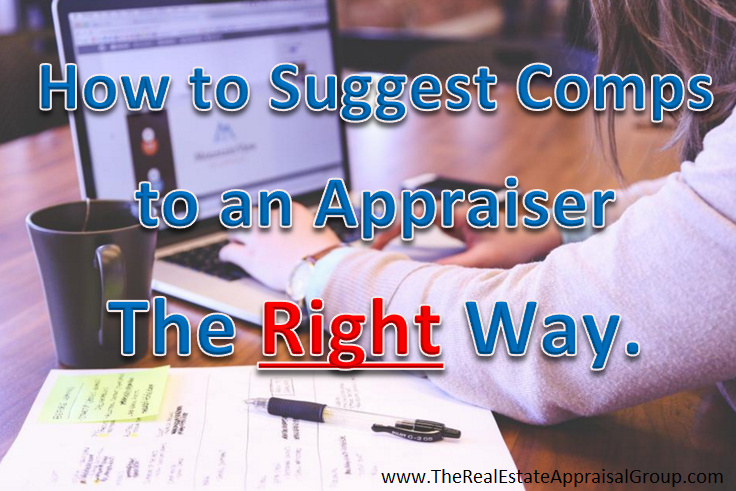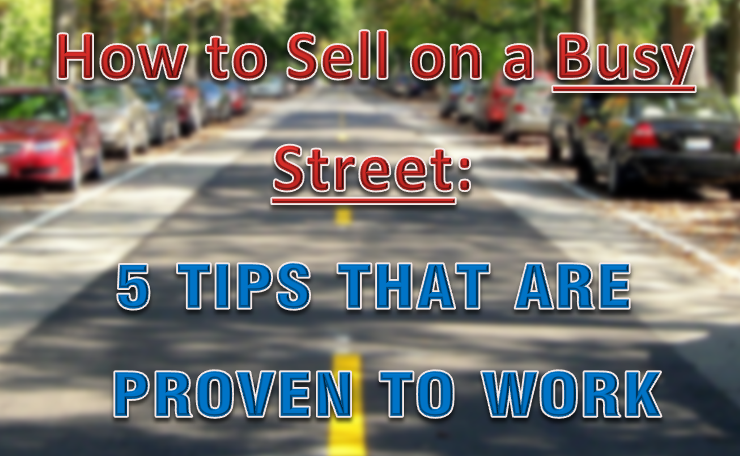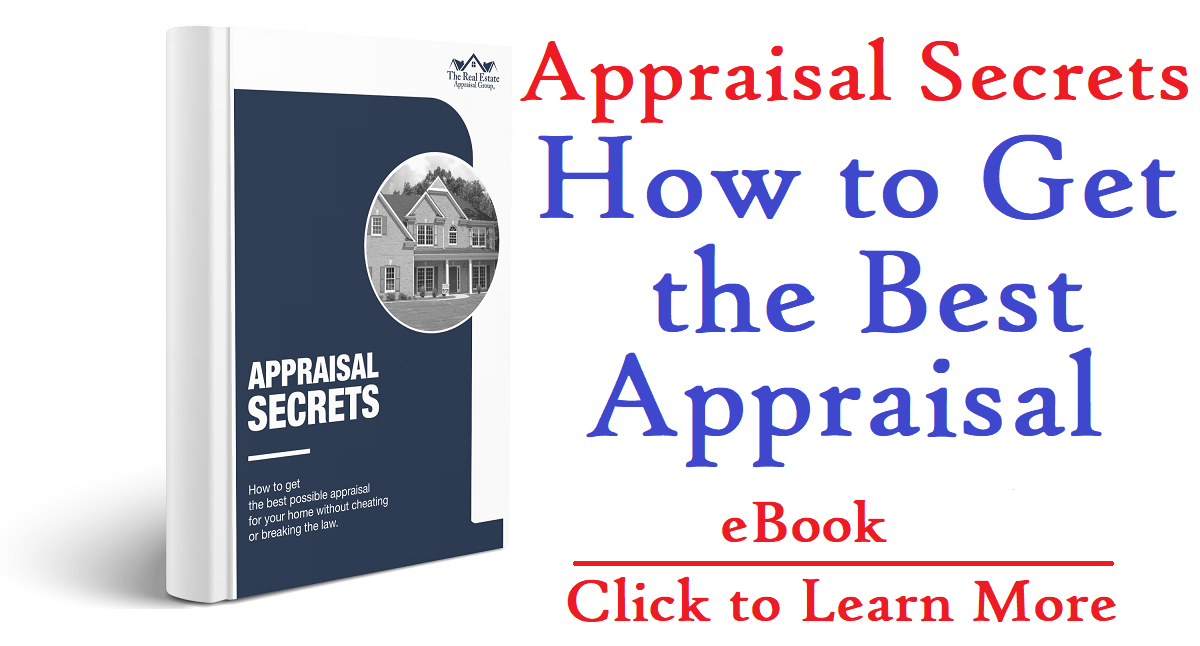
by Jonathan Montgomery | Nov 12, 2015 | Uncategorized
In our experience, real estate agents and real estate appraisers have different motives when searching for comparables. Appraisers always search for comps that are most similar to the subject property in a variety of ways- size, location, construction, etc. We do this in order to paint the most accurate picture of what a property is truly worth. Real estate agents tend to put these rules on the backburner, and search for comps that will best drive up the value of a home. If you want your real estate appraiser to take your comp suggestions seriously, keep these things in mind: Why Are You Suggesting Comps? Whatever the reason, be sure to state it when handing them over to the appraiser. If your suggesting comps because you happened across a similar house to the one being appraised and think it might help the appraiser, right on. If your sole purpose is to offer comps that will help improve the value (which is obvious to a good appraiser), stop right there. It’s not okay to try and persuade or coerce a real estate appraiser to “hit your mark”, or appraise the property at or above a certain value. Picking sub-par comps in order to encourage positive price adjustments is an obvious ploy. If you’re not suggesting comps to try and make the appraiser’s job easier or to be generally helpful, it’s doubtful the appraiser will give your comps a second look. Are the Comps You’re Suggesting Close in Size? This should be a no-brainer, but you’d be surprised how often we get suggestions that make us think...

by Jonathan Montgomery | Oct 28, 2015 | Uncategorized
Everyone Makes Mistakes. Real estate is a difficult business to get into, and a more complicated business than most understand- it’s not uncommon for new real estate agents (and even seasoned ones) to feel overwhelmed or a bit confused from time to time. Here are a few common mistakes we see both new and experienced real estate professionals make for you to avoid: 1. Insufficient Funding Life costs money, and being a real estate agent is no different. It takes funding to build a business. Whether that means taking out a business loan, or asking friends/family for help in the beginning- it typically takes a minimum of three months or more of reserve savings before becoming a full time real estate agent is truly viable. 2. Lack of a Business Plan There are a lot of parallels between becoming a real estate agent and starting your own business- both require a plan. Having clear goals helps you set a timeline, and having a timeline in mind helps one decide how they plan to accomplish them. Without a business plan, spending money inefficiently becomes an all-to-common mistake, and one that you usually can’t spot until it’s too late. 3. Choosing the Wrong Brokerage There are a number of things every agent should consider before picking their broker- how competitive their split percentage is, whether or not they have a good reputation, how many clients they currently have… the list goes on. What’s important for every real estate professional is whether or not they’re taking the right reasons into consideration. Regardless of how close to your house your potential new...
by The Real Estate Appraisal Group | Oct 21, 2015 | Uncategorized
Having the nicest house in the neighborhood may seem like something to take pride in, and in some ways it is- but when it comes to selling your home, it’s the last thing you want. The value of a house is partially based the value of others in the neighborhood, meaning that if you’re at the top of the list, then there’s nowhere else to go… but down. If you’re in a similar situation, it’s not the end of the world- there are still things you can do to squeeze as much value as possible out of your home. 1. Show Your House at the Right Time of Day Some neighborhoods look better at certain times of the day than others- it’s important to keep this in mind when you schedule times to show your home. If your home is on a busy street, try to avoid early morning and evening showings when the neighborhood traffic would be most noticeable. If some of the other properties in the area have negative curb appeal- but traffic and safety aren’t a concern, try to schedule showings in the evening. If you’re unsure when the area looks best, step outside during different times during the day and try to make an educated decision. 2. Pick the Correct Agent Some people thing agents are like soul-mates- there’s an agent for every home out there somewhere. There are agents out there who specialize in complicated or hard to sell properties. While it’s safe to assume that every agent will always try to the best of their abilities, it’s worth looking for one...

by Jonathan Montgomery | Oct 14, 2015 | Uncategorized
It’s common knowledge that when trying to sell, most people put at least a little money into some improvements or repairs before putting a house up on the market. When you’re working with limited funds, exactly how and where to spend that money to make sure you get the biggest bang for your buck can be puzzling. If you ask any real estate professional for advice on this, there’s no doubt they’d recommend you spend at least a little money trying to improve your property curb or drive-by appeal. It goes without saying that better-looking homes attract more buyers and tend to sell faster than ugly ones. It also goes without saying that nothing screams curb appeal like a well-kept lawn. According to Lawn and Landscape Magazine, a well maintained and landscaped lawn can increase the value of a property between 5 and 25% when compared to other homes in the area. When most people think of landscaping, images of bulldozers and hardhats come to mind. In actuality, there are a few easy ways that some simple landscaping can improve the curb appeal and value of your home: Adding Native Plants. Adding native flowers or plants to your yard can do a lot to improve the curb appeal of your home, and being native to the area will help them thrive with little to no maintenance. Michigan State University estimates that well maintained local plants and landscaping can improve the value of your home by up to 11%. Planting Trees. Trees can do a lot for a house: they provide shade in the summer or break...

by Jonathan Montgomery | Oct 8, 2015 | Uncategorized
Trying to sell a property on a busy steet certainly comes with it’s roadblocks. Almost every home buyer has to compromise on something they want when buying their first home. It might be a 3rd bedroom bedroom. It might be a large back yard. When living near a road with high traffic, the compromise is usually peace and quiet. Homes near busy roads can sell for upwards of 15% less than nearby similar ones- they attract far fewer buyers than those in the rest of the neighborhood. To buyers who don’t mind, this is great news- there are always solutions to dealing with the sound of the street. https://youtu.be/X71NT57B_bA Here are 5 tips to keep in mind when dealing with with homes near traffic: 1. You Can Make the Inside Quieter. Even something as simple as a blowing fan can make the sounds of traffic less noticeable. Playing soft music around the house can help distract buyers from the outside noise- especially in rooms with windows. A nice pair of heavy drapes can help some, but the most important thing is to make sure windows are sealed correctly with caulk and weather strips. The more expensive triple-pane or noise reducing windows will really do the trick if it’s a serious problem. 2. Make That “For Sale” Sign Pop. This is one of the few advantages of living near a busy road. With more people passing by, your street sign will get more exposure. To attract more buyers, try to include more information about the house by putting more information in the sign: RENOVATED! POOL! 3 BEDROOM! and...






Recent Comments